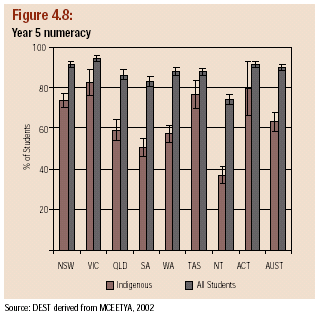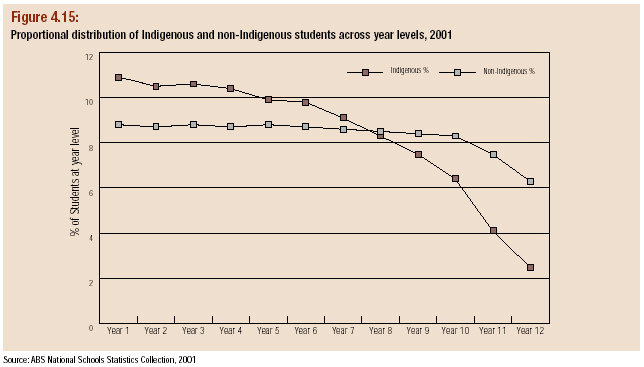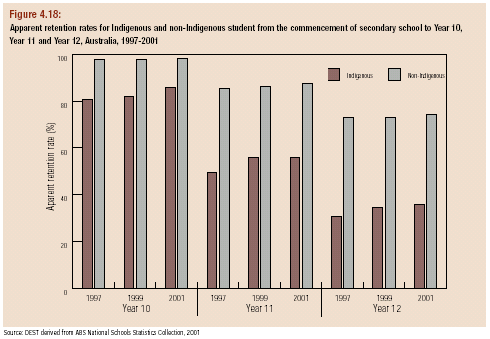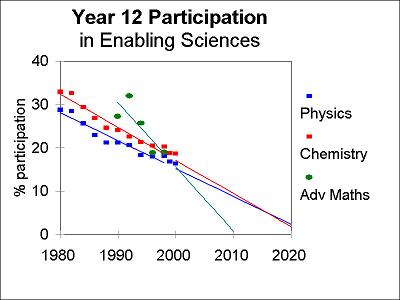|
|
|
 |
"To those of you who argue from the higher education sector that there is a crisis, can I just say to you, please desist at that kind of language... If you want to see a crisis, have a look at school attendance by Aboriginal Australians in Arnhemland: 25-54%. If you want to see a crisis in education, consider that only 16 of 378 Aboriginal children outside of Darwin and Alice Springs can pass a basic year 3 reading test." [Dr. Brendan Nelson, to the AAS dinner, May, 2002].
This past week the Department of Education Science and Training issued its 158
page paper,
National Report to Parliament on Indigenous Education and Training, 2001![]() .
It makes interesting and depressing reading. Rather than paraphrase the report
several of the charts accompanying it give graphic detail to Dr. Nelson's
remark, "
.
It makes interesting and depressing reading. Rather than paraphrase the report
several of the charts accompanying it give graphic detail to Dr. Nelson's
remark, "
ACER [Australian Council of Educational Research] reported that there were clearly large differences in mathematical and scientific literacy skills between the Indigenous and non-Indigenous students on average. Moreover, ACER regarded these differences as statistically significant at a very high level of confidence, and clearly significant in educational terms (p.43).

Although there are issues that need to be considered when referring to the apparent retention rate from Year 7/8 to Year 12, retention rates from the beginning of secondary school are recognised as a useful measure. Their usefulness lies mainly in their capacity to clearly show the differences between Indigenous and non-Indigenous retention, and to monitor the extent of gaps, identifying declines or improvements (MCEETYA, 2000). (p.57)
Although the gaps between Indigenous and non-Indigenous students remained substantial, improvements for Indigenous students occurred across all three Year levels: 10, 11 and 12. For example, the Year 10 apparent retention rate improved from 80.6% in 1997, to 82.0% in 2000, to 85.7% in 2001. (p.58)
So in fact while there was a 3.7% increase in retention rate for indigenous students from years 10 to 12 the gap between the indigenous and non-indigenous students widened. And just to really elevate the spirits of our most depressed underclass:

The Minister for Education, Science and Training, certainly has a point when he waves his demonstrative hand at what his and previous governments have failed to accomplish with regard to providing even minimally adequate education for our aboriginal citizens. However, the fact is that governmental redress of the problem seems to equate with supplying a mix of inadequate resources together with a paucity of ideas.
To get back to Dr. Nelson's chastisement of the members of the Australian
Academy of Science and then reinforcing it a couple of days later with his
address at a
National Press Club luncheon. What might have been seen as
a scathing reply was
delivered on September 20th ... but a
year earlier. The release by the Minister of the
The umbrella organisations for, engineering, chemistry, physics and mathematics ask: "Is the 2020 Vision for Australian Science and Engineering NO SCIENCE AND ENGINEERING?"
Why?
If the current rate of university staff losses continue, there will be no Chemistry, Physics, Mathematics or Engineering to support innovation after 2020AD.
If the current rate of secondary school participation in Chemistry, Physics and Mathematics continues there will be no enabling science in secondary schools beyond 2020AD.
An alarmist gross overstatement? Well have a look.
Many years ago Billy Rose, the archetypical New York entrepreneur, stalled his Cadillac convertible at a 5th Avenue stop light and after the light had turned green then red then green and red again for three cycles the burly NYC cop walked over and leaned on the window sill saying, "what's the matter, Mr. Rose, haven't we got a colour you like?"
So, what's the problem, Dr. Nelson, hasn't higher education got the sort of
crisis you like?
______________________________
Note: I




